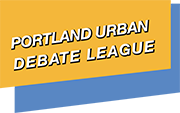Why Debate Matters
College Admissions, College Readiness, & Standardized Tests
Research has confirmed repeatedly that debaters (a) have an advantage in college admissions and (b) are more likely to meet college readiness benchmarks, as measured by standardized test scores. Dr. Luong found that even without winning major awards, debaters stood a 4% better chance of being admitted to college than similar non-debaters. This is a higher improvement in college admission chances than any other extra-curricular activity. Winning a state or other major award in debate improves an applicant’s chances by at least 22% (Luong, “Forensics and College Admissions”, Rostrum, November 2000).
Of course, getting into college doesn’t matter if students aren’t ready to do well. Yet the results on standardized tests–specifically, those designed to measure college readiness–show that debaters are better prepared for college than their non-debating peers. One researcher, using a hybrid longitudinal and cross-sectional design, found that students in competitive forensics made larger gains from eighth-grade to tenth-grade than similarly matched students (in Honors English but not in forensics) on their state standardized tests. The larger gains were built on similar eighth-grade scores, ruling out self-selection bias. Furthermore, the students in competitive forensics also earned higher ACT scores, confirming the results on the state tests (Peters, “An Investigation into the Relationship between Competitive Forensics and Standardized Test Scores”, Rostrum, October 2004).
An independent study by the Minneapolis Public Schools’ Research, Evaluation and Assessment Department found that participants in the Minneapolis U.D.L. “gained approximately 14% growth over the year, or 4.4 points above and beyond what they were expected to reach on the MCA Reading test” [emphasis added] (“2014-15 Urban Debate League MPS Evaluation”, September 2015). These represent gains above the baseline growth expected for all students.
However, the most definitive research comes from administrative-level data in Chicago, which has allowed researchers to control for self-selection. The data set, covering a decade of U.D.L. participation from 1997 to 2007, crucially contained the eighth-grade (pre-debate) standardized test scores. Using this as a control variable, researchers found that, debaters attained higher scores on the A.C.T. and “were also more likely to reach the college-readiness benchmark on the English, Reading, and Science sections of the ACT. It is noteworthy that debaters in every risk index group were more likely to reach the college-readiness benchmark… ” [emphasis added] (Anderson & Mezuk, “Participating in a Policy Debate Program”, Journal of Adolescence, 2012). A previous version of their research found that African American males were twice as likely to hit the college-readiness benchmark on the English A.C.T. section–even after accounting for eighth-grade test scores prior to debating (Mezuk, “Urban Debate and High School Educational Outcomes for African American Males”, Journal of Negro Education, Summer 2009). While the connection between the English and reading sections to debate is obvious, the science result is fascinating. Approximately 60% to 70% of the A.C.T. Science section is based on the interpretation of experimental evidence and evaluation of two or more conflicting hypotheses, a skill debaters have marked practice with, even though in a social science, not natural science, context (A.C.T., Science Test Description, accessed March 2017).
